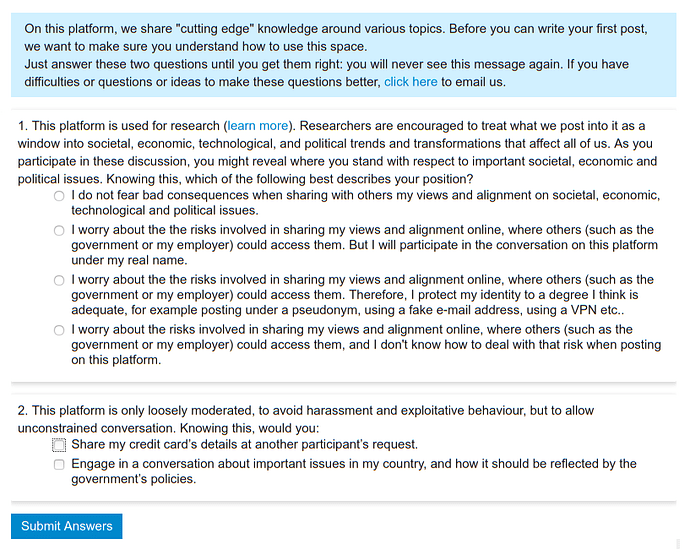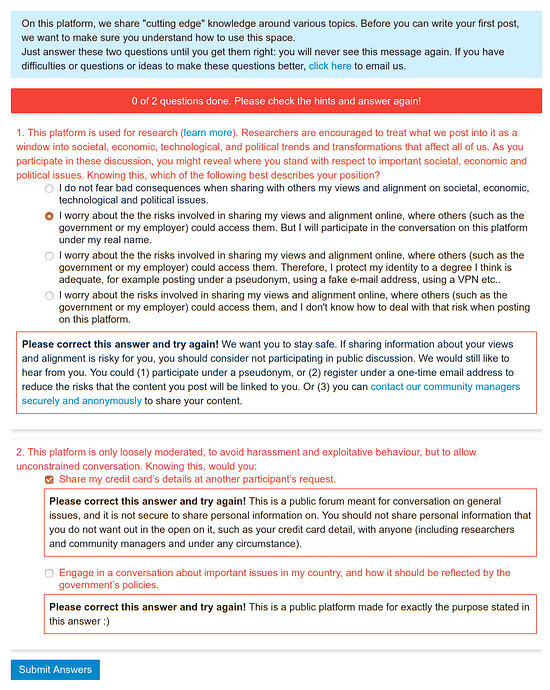Content
2. Consent on the forum: The consent funnel
3. Consent on the forum: Auxiliary methods
- 3.1. Physical events
- 3.2. Posting on edgeryders.eu before signup through an online form
- 3.3. One-on-one interviews
- 3.4. Interviewee posting her own interview
4. Consent for recording community calls
1. Background
edgeryders.eu is intended as a collective intelligence engine. Most conversations are part of one or more participatory processes, and are aggregated to produce a result. In other words, we almost always do some kind of research with Edgeryders material. This implies taking very seriously the issue of research ethics. In this topic, we document the different ways we acquire from participants to our conversations their informed consent to their content being used for research.
European Commission Research Ethics in Ethnography/Anthropology:
https://ec.europa.eu/research/participants/data/ref/h2020/other/hi/ethics-guide-ethnog-anthrop_en.pdf
2. Consent on the forum: The consent funnel
The so-called “consent funnel” is our default method of gathering informed consent from users for content they post on the edgeryders.eu forum. Here is how it works:
To post on edgeryders.eu, people need to create an account. The first time they open the editor to post from that account, the forum serves them a simple questionnaire to inform them of the website’s research purposes, and make sure they understand how to use it. Currently, the form looks like this:
As long as users provide wrong answers (for example, if they reply that they would gladly share their credit card number, or not protect their identity properly when worrying about consequences of posting their content), the questionnaire “stalls”, preventing the user from posting until he or she gets the response right:
Once the user provides the right answers, the website records that he or she has consented to participating in research and understands what that means. The date of completion of questionnaire is stored in the edgeryders.eu database.
Upon retrieval for data processing (for example, ethnographic coding or SSNA, only the content associated to users who have completed the process is served. This is necessary because some content was created before we put this process in place.
The text of the questions, answers and feedback is maintained in our Github repository. This is also the place to make necessary changes: edit the file, commit and ask @matthias to test and deploy the new version.
3. Consent on the forum: Auxiliary methods
3.1. Physical events
The process used for physical events, based on the workshop on Inequalities in the age of AI, works like this:
-
In the opening of the event, inform participants that notes will be taken, and they will be used for research. Introduce the research in question.
-
People are still encouraged to post on the platform; if they do, the consent funnel applies as usual.
This method is privacy-aware, but does not lead to well-formed social semantic networks because the identities of individual speakers are lost.
3.2. Posting on edgeryders.eu before signup through an online form
We have created two feeder websites. register.edgeryders.eu elicits reflections pertaining to our projects in the form of a registration to a physical event. listen.edgeryders.eu is a facility for reporting the results of listening triads during events. Both feeder websites contain questions pertaining to the research, and elicit one piece of structured data, the informant’s email address. Both contain a tick box next to a statement that the person filling the form understands that the content will be used for research. The statement uses the same wording as the consent funnel. If the box is not ticked, submission of content and email address is impossible.
Upon submitting the form, edgeryders.eu creates a new account associated to the email address in question; marks this new account as having successfully completed the ethical funnel; and posts the answers to the question in the form of a new topic, whose authorship is attributed to the newly created account.
3.3. One-on-one interviews
For one-on-one interviews, two methods have been used. One is a more or less standard informed consent process.
TODO: Link a resource with available evidence (email threads?).
The second method re-uses the idea of questions that the interviewee must answer, and proposes the same questions that the consent funnel does, only in paper form.
TODO: Collect the signed form and link to a resource where they can be found.
3.4. Interviewee posting her own interview
This process was prototyped by @hugi at Internetdagarna and works as follows:
-
You need an installation of the edgeryders-form software, with the form configured with the questions you want to ask the interviewees.
-
At the beginning of the interview, explain that at its end they would be asked to provide a username and e-mail address and that an account would be created for them at edgeryders.eu with that information and their transcribed answers would be posted under that account. Explain that they would get a confirmation email and that they could log in and update or delete the post at any time, and that they can also participate in the conversation as they please.
-
Transcribe their answers as well as possible during the interview. That means entering their answers into the form software while sitting next to them or across from them. You can ask follow-up questions to dig deeper before moving on.
-
At the last page of the form software, ask them to choose a username and provide an e-mail address. Explain that the e-mail address will not be made public and will only be available to staff members. Also explain that they can choose a username that makes them anonymous if they so please.
-
Asked the participant to carefully read the consent text, and then to check the consent box themselves and press the send button. The consent text should be as follows (here in English only, but potentially also translated):
“I understand that submitting this form will create an account for me on edgeryders.eu, and that my responses will be posted by that account. I understand that I can log in at any time and update my answer or continue the conversation with other participants. I understand that this form is used for community driven research. Researchers are encouraged to treat your answers as a window into societal, economic, technological, and political trends and transformations that affect us.”
4. Consent for recording community calls
Some people ask us to post audio recordings of community calls. We recommend not to do this, as doing this ethically is quite tricky. Much better to post written accounts, authored by a specific individual (normally a community manager), and viewed through the lens of their subjectivity. Additionally, community calls are meant to encourage casual sociality, and we have found that people are more reluctant to socialize if they know there are permanent records of their interaction.
If you still decide to go ahead and do it, you need to make sure that people give their consent before the call, ideally in writing. This is because consent is not supposed to be sprung on people: they need to have time to consider whether to give it or not. In a group setting, there is the additional issue that an individual might feel pressured to say yes if everyone else has said yes. When you start the call, begin by confirming that everyone is still OK with the consent they have given. If someone comes on the call that has not given consent, you are then supposed to stop recording.
5. Additional resources
For cases not covered here, the Association of Internet Researchers has ethical guidelines. See also their 2019 report.


